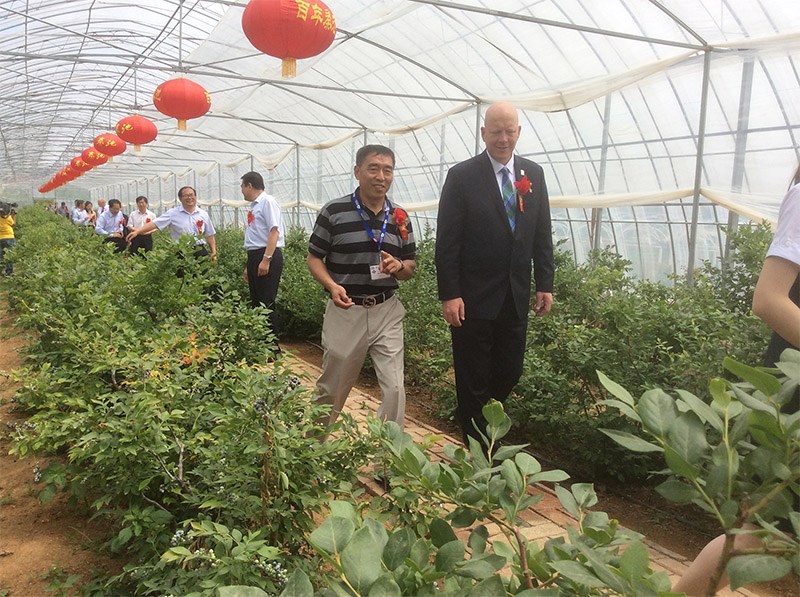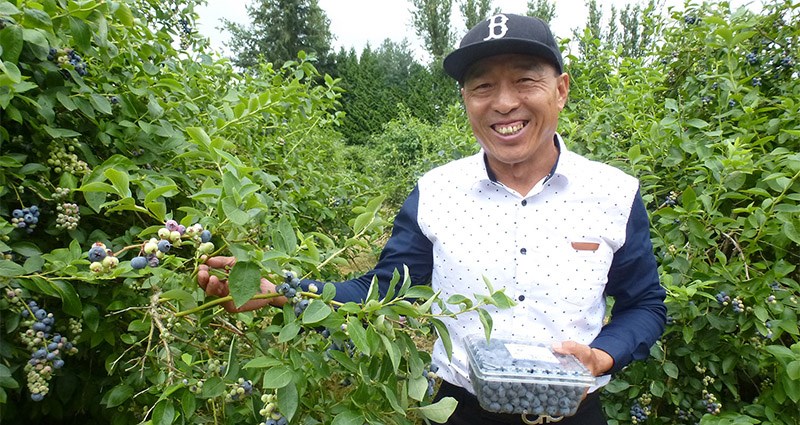A Coquitlam entrepreneur is bullish on blueberries after Canada inked a deal with China allowing the export of Canadian high-bush, non-wild blueberries.
William Wang, who owns blueberry farms in Port Coquitlam, Pitt Meadows and Maple Ridge, says wealthy people in China will pay top dollar for Canadian blueberries but believes there is even more money to be made in processing blueberries for wine and jam.
"More and more people are demanding blueberries because they are good for the eyes and heart," said Wang, who is also a tai chi master and has a passion for healthy living.
This is the first full season B.C. blueberries are being shipped to China and estimates suggest blueberry growers could be looking at the potential of up to $65 million in exports a year once the agreement is fully implemented.
As blueberries are Port Coquitlam and Coquitlam's largest agricultural crop, the trade deal could help promote agriculture in the Tri-Cities.

But there are challenges: High duties make the berries expensive for average Chinese buyers, the season is short for fresh berries, growers and processors must meet Chinese specifications, and risks are high, Wang said.
What's more, it's costly to ship blueberries by air and he's looking into the viability of shipping via refrigerated container but is struggling to find the infrastructure here in B.C.
Still, Wang says he's looking into every option for exporting the highly-praised B.C. blueberries, among the best in the world because of the high acid, low pH soil they're grown in.
"Canada has the best blueberries, especially the Fraser Valley."
A STRONG MARKET
Wang said Chinese people value Canadian products. One of the reasons for this is the country's veneration for Dr. Norman Bethune, a Canadian physician who is well known for risking his life for the sick and wounded in China during Sino-Japanese war in the 1930s.
Wang, who was born in China, and immigrated to Canada 14 years ago after living in the U.S. for 12 years, began buying blueberry farms about five years ago and recently developed an interest in exporting blueberry wine, which he purchases from wineries in Pitt Meadows.
More popular than grape wine, blueberry wine sells for about $53 for a 750 ml bottle in China and Wang says he can't keep up with the demand.
Recently, he opened a blueberry farm and winery in Weifang, a tourist city in China, together with a Chinese partner, but says the berries grown there aren't nearly as good as those grown in the Fraser Valley.
If he can find land in Port Coquitlam or the Pitt Meadows area, Wang said he would like to set up a processing plant that could produce blueberry concentrate for wine. The trouble is that agricultural land is at a premium, especially in PoCo, where there is pressure to develop.
Mayor Greg Moore said he was impressed with Wang's Qin Chi Blueberry Winery joint venture when he visited the winery in May. It features 300 acres of blueberries, green houses, a large wine cellar, landscaped walkways and ponds, and could soon have a hotel, restaurant and cottages.
"I was amazed because they are creating a blueberry experience," Moore told The Tri-City News.
INVESTMENT NEEDED
But Moore cautioned that while processing facilities might be allowed on agricultural land, he doesn't want to see viable farm land given up without some kind of enhanced investment.
"If William and his partners were thinking about putting in a processing facility, they'd want to do more farming around it," he said, adding, "Our farmland isn't overly productive today. A lot of people are only getting hay off it once or twice a year."
Some of PoCo's farmland is also under pressure from development around the planned Fremont connector, although the Agricultural Land Commission maintains it doesn't support withdrawals from the Agricultural Land Reserve in the area, and some urban farmers think the land should be protected for growing vegetables for local consumption, not growing single crops for export.
Moore, who is also the Metro Vancouver board chair, agrees that there is a discussion worth having on whether farmland should be used to grow vegetables for local people or crops for export, and said building on farmland, should come with proviso that developers also invest in more farming.
Wang agreed that investment in B.C. farming is necessary and believes the Chinese demand for healthy blueberries may be just what's needed to ensure agriculture is viable for years to come.
"I'm a farmer," he says, grabbing a handful of large, purple berries from a fresh-picked tub, "I want to do some good."



